The Impact of Environmental Factors on Malaria Transmission in Urban Areas
VerifiedAdded on 2019/11/19
|8
|2183
|300
Report
AI Summary
The essay discusses the epidemiology and ecology of malaria, a mosquito-borne disease that causes significant morbidity and mortality worldwide. It highlights the importance of understanding the factors contributing to malaria transmission, such as temperature, rainfall, and humidity. The essay also touches on the control measures used to prevent and treat malaria, including vector control, parasite control, and the development of vaccines. Furthermore, it emphasizes the need for continued funding and sustained efforts to reduce incidence and achieve elimination goals.
Contribute Materials
Your contribution can guide someone’s learning journey. Share your
documents today.
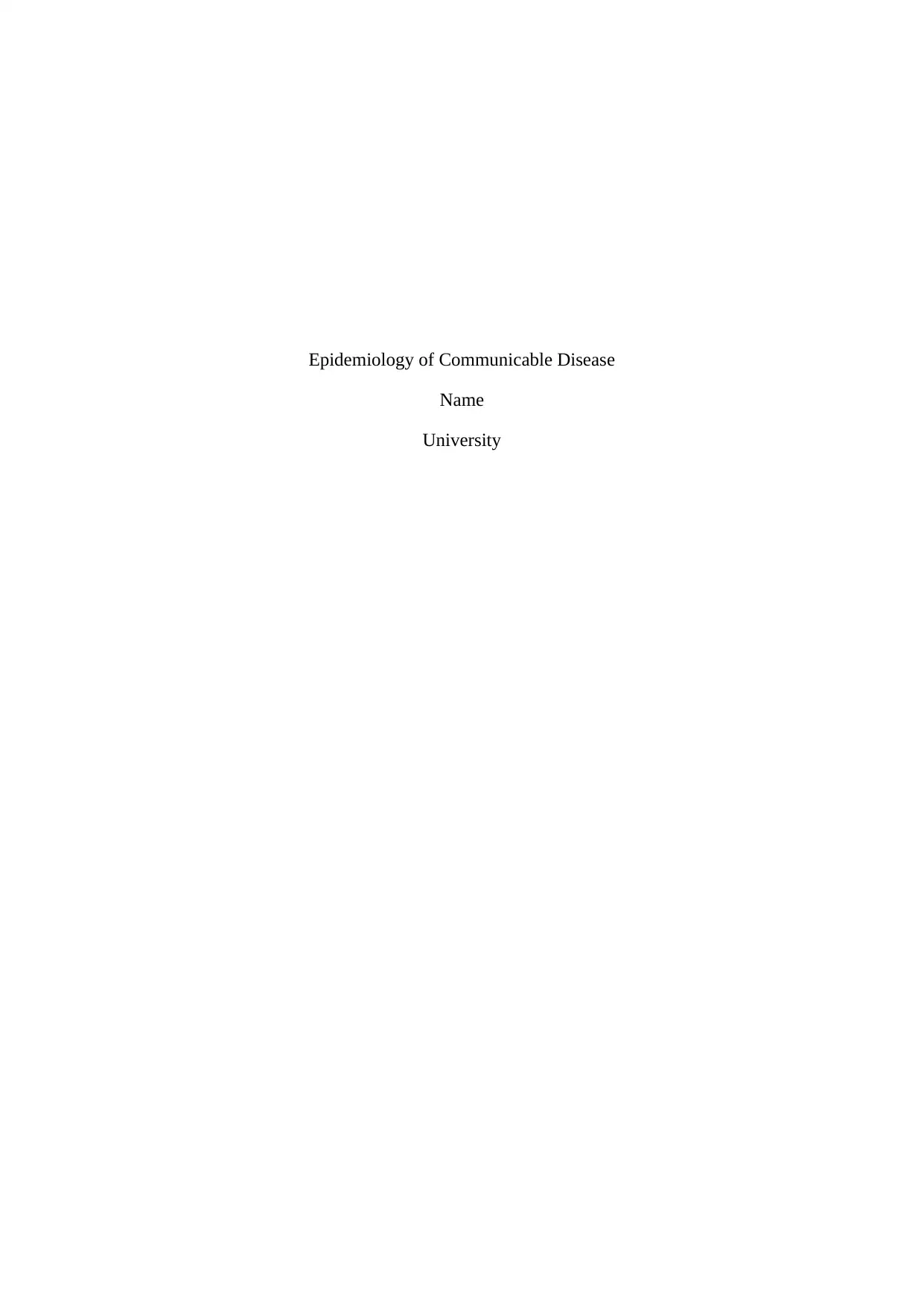
Epidemiology of Communicable Disease
Name
University
Name
University
Secure Best Marks with AI Grader
Need help grading? Try our AI Grader for instant feedback on your assignments.
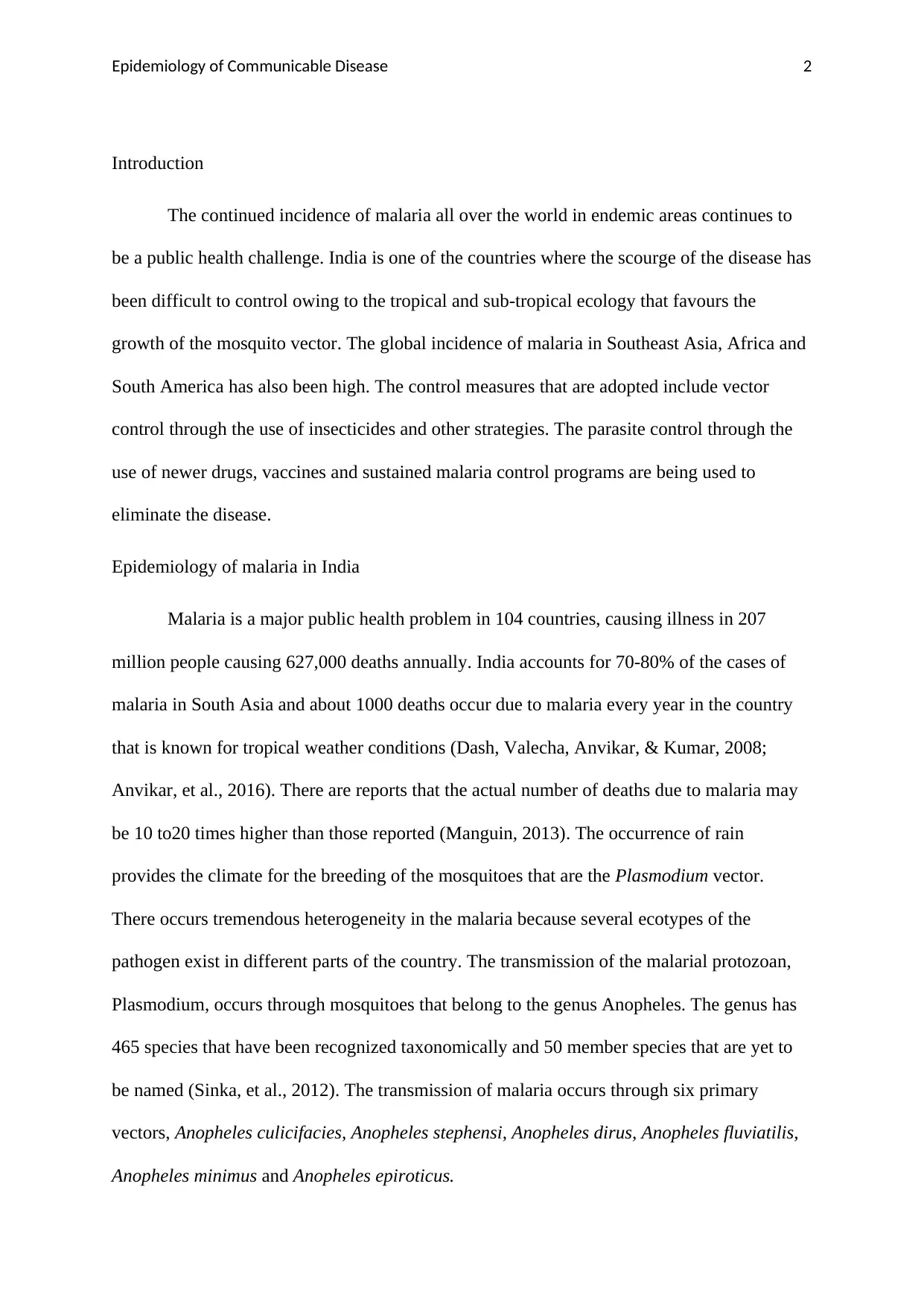
Epidemiology of Communicable Disease 2
Introduction
The continued incidence of malaria all over the world in endemic areas continues to
be a public health challenge. India is one of the countries where the scourge of the disease has
been difficult to control owing to the tropical and sub-tropical ecology that favours the
growth of the mosquito vector. The global incidence of malaria in Southeast Asia, Africa and
South America has also been high. The control measures that are adopted include vector
control through the use of insecticides and other strategies. The parasite control through the
use of newer drugs, vaccines and sustained malaria control programs are being used to
eliminate the disease.
Epidemiology of malaria in India
Malaria is a major public health problem in 104 countries, causing illness in 207
million people causing 627,000 deaths annually. India accounts for 70-80% of the cases of
malaria in South Asia and about 1000 deaths occur due to malaria every year in the country
that is known for tropical weather conditions (Dash, Valecha, Anvikar, & Kumar, 2008;
Anvikar, et al., 2016). There are reports that the actual number of deaths due to malaria may
be 10 to20 times higher than those reported (Manguin, 2013). The occurrence of rain
provides the climate for the breeding of the mosquitoes that are the Plasmodium vector.
There occurs tremendous heterogeneity in the malaria because several ecotypes of the
pathogen exist in different parts of the country. The transmission of the malarial protozoan,
Plasmodium, occurs through mosquitoes that belong to the genus Anopheles. The genus has
465 species that have been recognized taxonomically and 50 member species that are yet to
be named (Sinka, et al., 2012). The transmission of malaria occurs through six primary
vectors, Anopheles culicifacies, Anopheles stephensi, Anopheles dirus, Anopheles fluviatilis,
Anopheles minimus and Anopheles epiroticus.
Introduction
The continued incidence of malaria all over the world in endemic areas continues to
be a public health challenge. India is one of the countries where the scourge of the disease has
been difficult to control owing to the tropical and sub-tropical ecology that favours the
growth of the mosquito vector. The global incidence of malaria in Southeast Asia, Africa and
South America has also been high. The control measures that are adopted include vector
control through the use of insecticides and other strategies. The parasite control through the
use of newer drugs, vaccines and sustained malaria control programs are being used to
eliminate the disease.
Epidemiology of malaria in India
Malaria is a major public health problem in 104 countries, causing illness in 207
million people causing 627,000 deaths annually. India accounts for 70-80% of the cases of
malaria in South Asia and about 1000 deaths occur due to malaria every year in the country
that is known for tropical weather conditions (Dash, Valecha, Anvikar, & Kumar, 2008;
Anvikar, et al., 2016). There are reports that the actual number of deaths due to malaria may
be 10 to20 times higher than those reported (Manguin, 2013). The occurrence of rain
provides the climate for the breeding of the mosquitoes that are the Plasmodium vector.
There occurs tremendous heterogeneity in the malaria because several ecotypes of the
pathogen exist in different parts of the country. The transmission of the malarial protozoan,
Plasmodium, occurs through mosquitoes that belong to the genus Anopheles. The genus has
465 species that have been recognized taxonomically and 50 member species that are yet to
be named (Sinka, et al., 2012). The transmission of malaria occurs through six primary
vectors, Anopheles culicifacies, Anopheles stephensi, Anopheles dirus, Anopheles fluviatilis,
Anopheles minimus and Anopheles epiroticus.
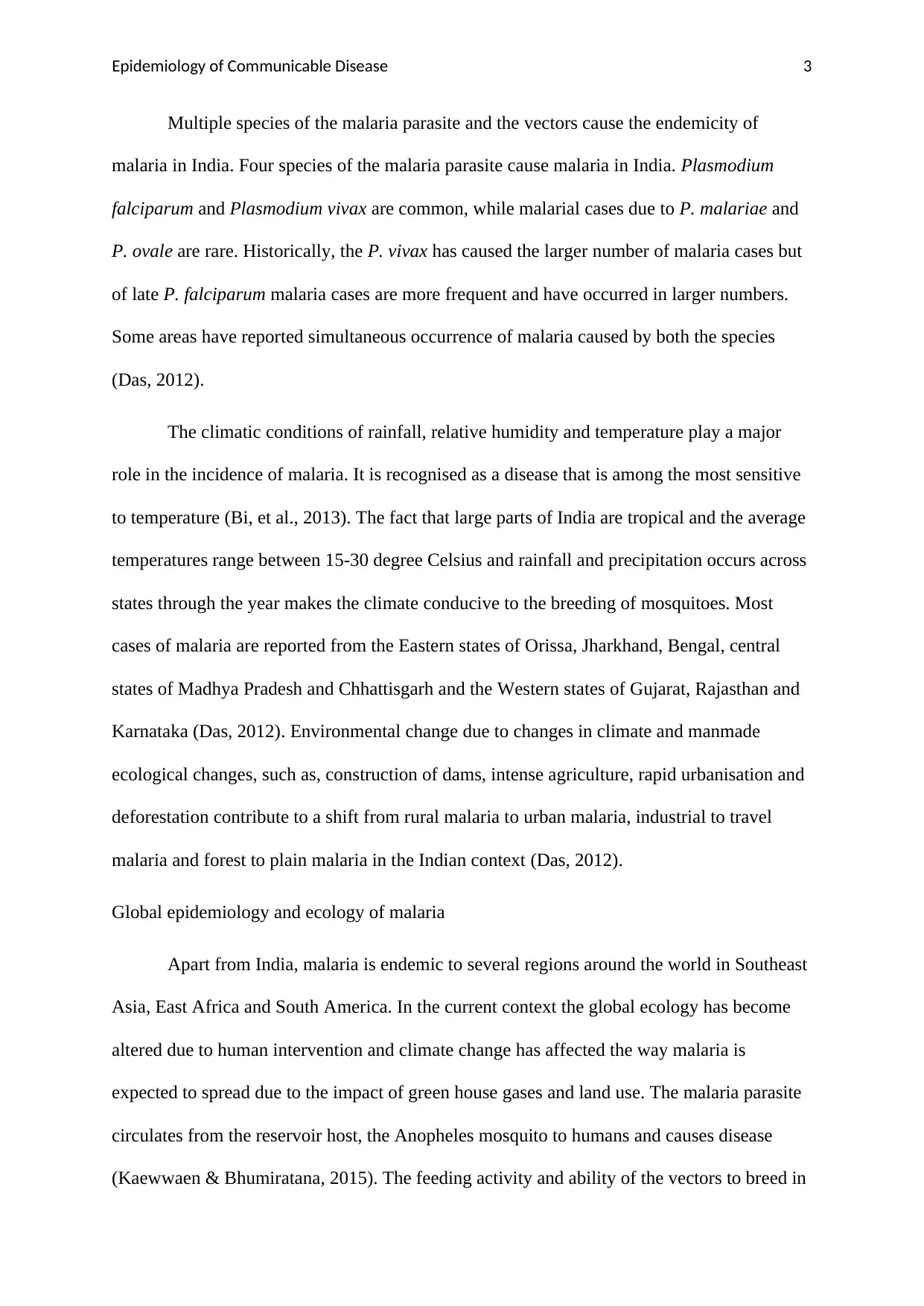
Epidemiology of Communicable Disease 3
Multiple species of the malaria parasite and the vectors cause the endemicity of
malaria in India. Four species of the malaria parasite cause malaria in India. Plasmodium
falciparum and Plasmodium vivax are common, while malarial cases due to P. malariae and
P. ovale are rare. Historically, the P. vivax has caused the larger number of malaria cases but
of late P. falciparum malaria cases are more frequent and have occurred in larger numbers.
Some areas have reported simultaneous occurrence of malaria caused by both the species
(Das, 2012).
The climatic conditions of rainfall, relative humidity and temperature play a major
role in the incidence of malaria. It is recognised as a disease that is among the most sensitive
to temperature (Bi, et al., 2013). The fact that large parts of India are tropical and the average
temperatures range between 15-30 degree Celsius and rainfall and precipitation occurs across
states through the year makes the climate conducive to the breeding of mosquitoes. Most
cases of malaria are reported from the Eastern states of Orissa, Jharkhand, Bengal, central
states of Madhya Pradesh and Chhattisgarh and the Western states of Gujarat, Rajasthan and
Karnataka (Das, 2012). Environmental change due to changes in climate and manmade
ecological changes, such as, construction of dams, intense agriculture, rapid urbanisation and
deforestation contribute to a shift from rural malaria to urban malaria, industrial to travel
malaria and forest to plain malaria in the Indian context (Das, 2012).
Global epidemiology and ecology of malaria
Apart from India, malaria is endemic to several regions around the world in Southeast
Asia, East Africa and South America. In the current context the global ecology has become
altered due to human intervention and climate change has affected the way malaria is
expected to spread due to the impact of green house gases and land use. The malaria parasite
circulates from the reservoir host, the Anopheles mosquito to humans and causes disease
(Kaewwaen & Bhumiratana, 2015). The feeding activity and ability of the vectors to breed in
Multiple species of the malaria parasite and the vectors cause the endemicity of
malaria in India. Four species of the malaria parasite cause malaria in India. Plasmodium
falciparum and Plasmodium vivax are common, while malarial cases due to P. malariae and
P. ovale are rare. Historically, the P. vivax has caused the larger number of malaria cases but
of late P. falciparum malaria cases are more frequent and have occurred in larger numbers.
Some areas have reported simultaneous occurrence of malaria caused by both the species
(Das, 2012).
The climatic conditions of rainfall, relative humidity and temperature play a major
role in the incidence of malaria. It is recognised as a disease that is among the most sensitive
to temperature (Bi, et al., 2013). The fact that large parts of India are tropical and the average
temperatures range between 15-30 degree Celsius and rainfall and precipitation occurs across
states through the year makes the climate conducive to the breeding of mosquitoes. Most
cases of malaria are reported from the Eastern states of Orissa, Jharkhand, Bengal, central
states of Madhya Pradesh and Chhattisgarh and the Western states of Gujarat, Rajasthan and
Karnataka (Das, 2012). Environmental change due to changes in climate and manmade
ecological changes, such as, construction of dams, intense agriculture, rapid urbanisation and
deforestation contribute to a shift from rural malaria to urban malaria, industrial to travel
malaria and forest to plain malaria in the Indian context (Das, 2012).
Global epidemiology and ecology of malaria
Apart from India, malaria is endemic to several regions around the world in Southeast
Asia, East Africa and South America. In the current context the global ecology has become
altered due to human intervention and climate change has affected the way malaria is
expected to spread due to the impact of green house gases and land use. The malaria parasite
circulates from the reservoir host, the Anopheles mosquito to humans and causes disease
(Kaewwaen & Bhumiratana, 2015). The feeding activity and ability of the vectors to breed in
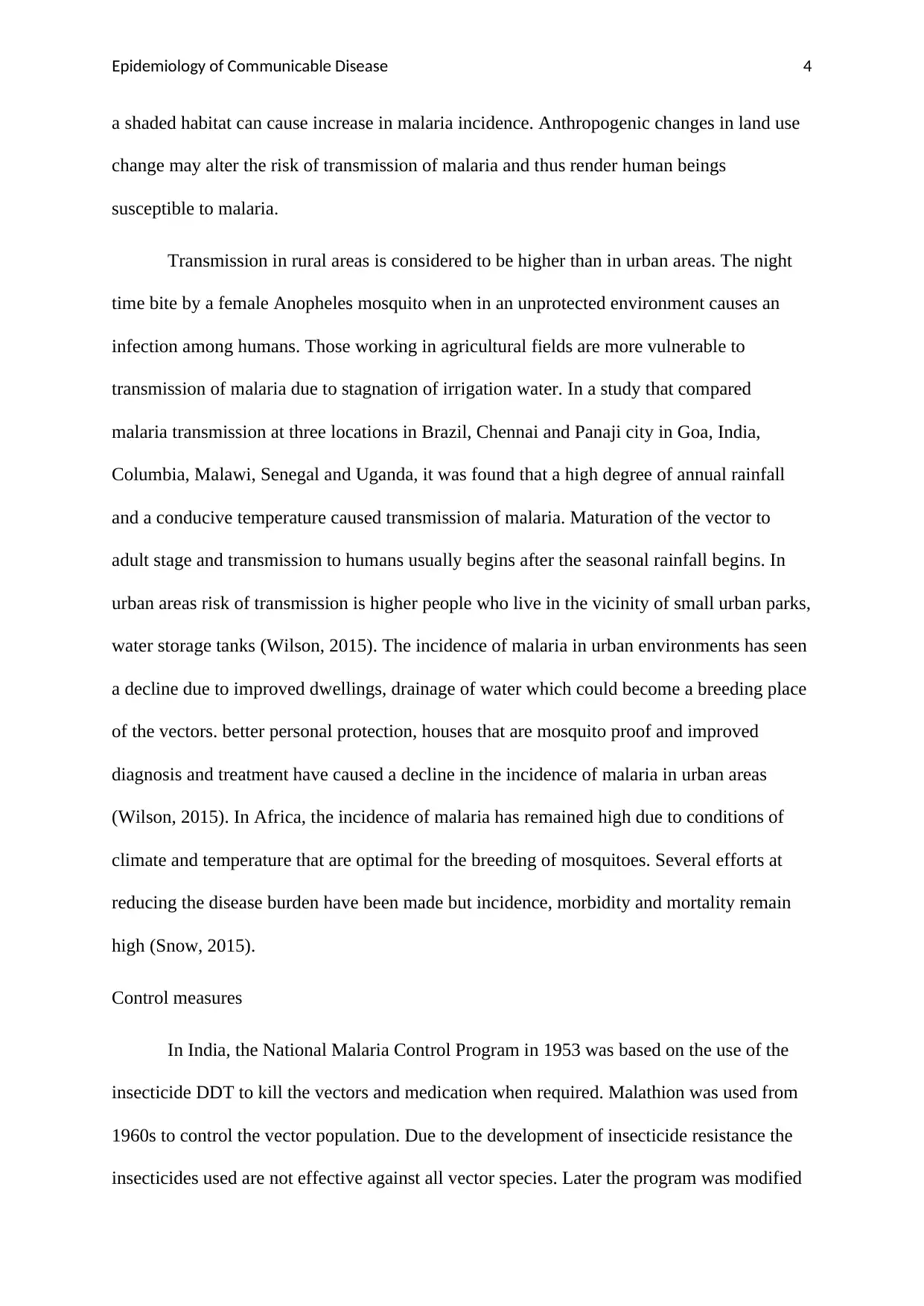
Epidemiology of Communicable Disease 4
a shaded habitat can cause increase in malaria incidence. Anthropogenic changes in land use
change may alter the risk of transmission of malaria and thus render human beings
susceptible to malaria.
Transmission in rural areas is considered to be higher than in urban areas. The night
time bite by a female Anopheles mosquito when in an unprotected environment causes an
infection among humans. Those working in agricultural fields are more vulnerable to
transmission of malaria due to stagnation of irrigation water. In a study that compared
malaria transmission at three locations in Brazil, Chennai and Panaji city in Goa, India,
Columbia, Malawi, Senegal and Uganda, it was found that a high degree of annual rainfall
and a conducive temperature caused transmission of malaria. Maturation of the vector to
adult stage and transmission to humans usually begins after the seasonal rainfall begins. In
urban areas risk of transmission is higher people who live in the vicinity of small urban parks,
water storage tanks (Wilson, 2015). The incidence of malaria in urban environments has seen
a decline due to improved dwellings, drainage of water which could become a breeding place
of the vectors. better personal protection, houses that are mosquito proof and improved
diagnosis and treatment have caused a decline in the incidence of malaria in urban areas
(Wilson, 2015). In Africa, the incidence of malaria has remained high due to conditions of
climate and temperature that are optimal for the breeding of mosquitoes. Several efforts at
reducing the disease burden have been made but incidence, morbidity and mortality remain
high (Snow, 2015).
Control measures
In India, the National Malaria Control Program in 1953 was based on the use of the
insecticide DDT to kill the vectors and medication when required. Malathion was used from
1960s to control the vector population. Due to the development of insecticide resistance the
insecticides used are not effective against all vector species. Later the program was modified
a shaded habitat can cause increase in malaria incidence. Anthropogenic changes in land use
change may alter the risk of transmission of malaria and thus render human beings
susceptible to malaria.
Transmission in rural areas is considered to be higher than in urban areas. The night
time bite by a female Anopheles mosquito when in an unprotected environment causes an
infection among humans. Those working in agricultural fields are more vulnerable to
transmission of malaria due to stagnation of irrigation water. In a study that compared
malaria transmission at three locations in Brazil, Chennai and Panaji city in Goa, India,
Columbia, Malawi, Senegal and Uganda, it was found that a high degree of annual rainfall
and a conducive temperature caused transmission of malaria. Maturation of the vector to
adult stage and transmission to humans usually begins after the seasonal rainfall begins. In
urban areas risk of transmission is higher people who live in the vicinity of small urban parks,
water storage tanks (Wilson, 2015). The incidence of malaria in urban environments has seen
a decline due to improved dwellings, drainage of water which could become a breeding place
of the vectors. better personal protection, houses that are mosquito proof and improved
diagnosis and treatment have caused a decline in the incidence of malaria in urban areas
(Wilson, 2015). In Africa, the incidence of malaria has remained high due to conditions of
climate and temperature that are optimal for the breeding of mosquitoes. Several efforts at
reducing the disease burden have been made but incidence, morbidity and mortality remain
high (Snow, 2015).
Control measures
In India, the National Malaria Control Program in 1953 was based on the use of the
insecticide DDT to kill the vectors and medication when required. Malathion was used from
1960s to control the vector population. Due to the development of insecticide resistance the
insecticides used are not effective against all vector species. Later the program was modified
Secure Best Marks with AI Grader
Need help grading? Try our AI Grader for instant feedback on your assignments.
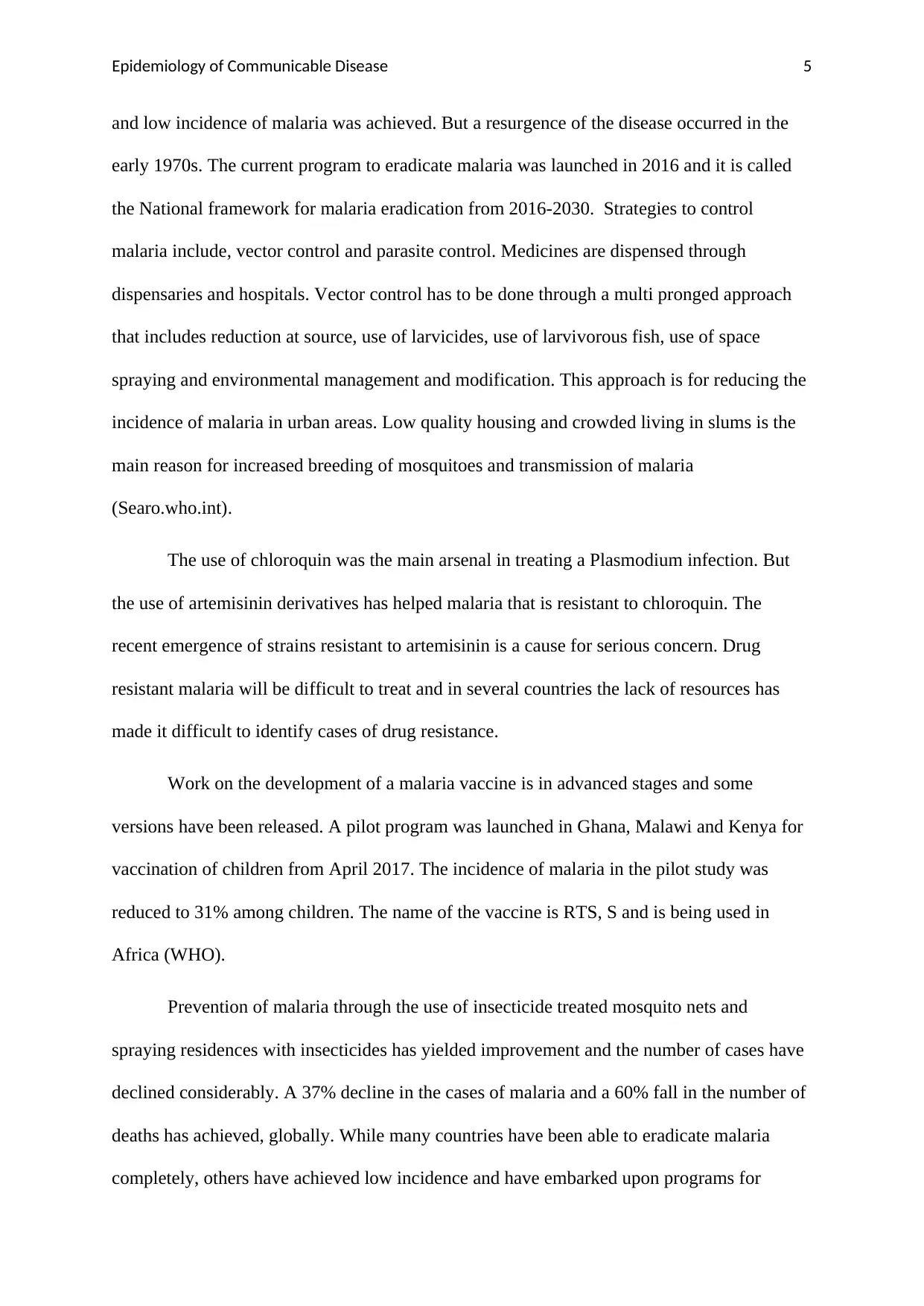
Epidemiology of Communicable Disease 5
and low incidence of malaria was achieved. But a resurgence of the disease occurred in the
early 1970s. The current program to eradicate malaria was launched in 2016 and it is called
the National framework for malaria eradication from 2016-2030. Strategies to control
malaria include, vector control and parasite control. Medicines are dispensed through
dispensaries and hospitals. Vector control has to be done through a multi pronged approach
that includes reduction at source, use of larvicides, use of larvivorous fish, use of space
spraying and environmental management and modification. This approach is for reducing the
incidence of malaria in urban areas. Low quality housing and crowded living in slums is the
main reason for increased breeding of mosquitoes and transmission of malaria
(Searo.who.int).
The use of chloroquin was the main arsenal in treating a Plasmodium infection. But
the use of artemisinin derivatives has helped malaria that is resistant to chloroquin. The
recent emergence of strains resistant to artemisinin is a cause for serious concern. Drug
resistant malaria will be difficult to treat and in several countries the lack of resources has
made it difficult to identify cases of drug resistance.
Work on the development of a malaria vaccine is in advanced stages and some
versions have been released. A pilot program was launched in Ghana, Malawi and Kenya for
vaccination of children from April 2017. The incidence of malaria in the pilot study was
reduced to 31% among children. The name of the vaccine is RTS, S and is being used in
Africa (WHO).
Prevention of malaria through the use of insecticide treated mosquito nets and
spraying residences with insecticides has yielded improvement and the number of cases have
declined considerably. A 37% decline in the cases of malaria and a 60% fall in the number of
deaths has achieved, globally. While many countries have been able to eradicate malaria
completely, others have achieved low incidence and have embarked upon programs for
and low incidence of malaria was achieved. But a resurgence of the disease occurred in the
early 1970s. The current program to eradicate malaria was launched in 2016 and it is called
the National framework for malaria eradication from 2016-2030. Strategies to control
malaria include, vector control and parasite control. Medicines are dispensed through
dispensaries and hospitals. Vector control has to be done through a multi pronged approach
that includes reduction at source, use of larvicides, use of larvivorous fish, use of space
spraying and environmental management and modification. This approach is for reducing the
incidence of malaria in urban areas. Low quality housing and crowded living in slums is the
main reason for increased breeding of mosquitoes and transmission of malaria
(Searo.who.int).
The use of chloroquin was the main arsenal in treating a Plasmodium infection. But
the use of artemisinin derivatives has helped malaria that is resistant to chloroquin. The
recent emergence of strains resistant to artemisinin is a cause for serious concern. Drug
resistant malaria will be difficult to treat and in several countries the lack of resources has
made it difficult to identify cases of drug resistance.
Work on the development of a malaria vaccine is in advanced stages and some
versions have been released. A pilot program was launched in Ghana, Malawi and Kenya for
vaccination of children from April 2017. The incidence of malaria in the pilot study was
reduced to 31% among children. The name of the vaccine is RTS, S and is being used in
Africa (WHO).
Prevention of malaria through the use of insecticide treated mosquito nets and
spraying residences with insecticides has yielded improvement and the number of cases have
declined considerably. A 37% decline in the cases of malaria and a 60% fall in the number of
deaths has achieved, globally. While many countries have been able to eradicate malaria
completely, others have achieved low incidence and have embarked upon programs for
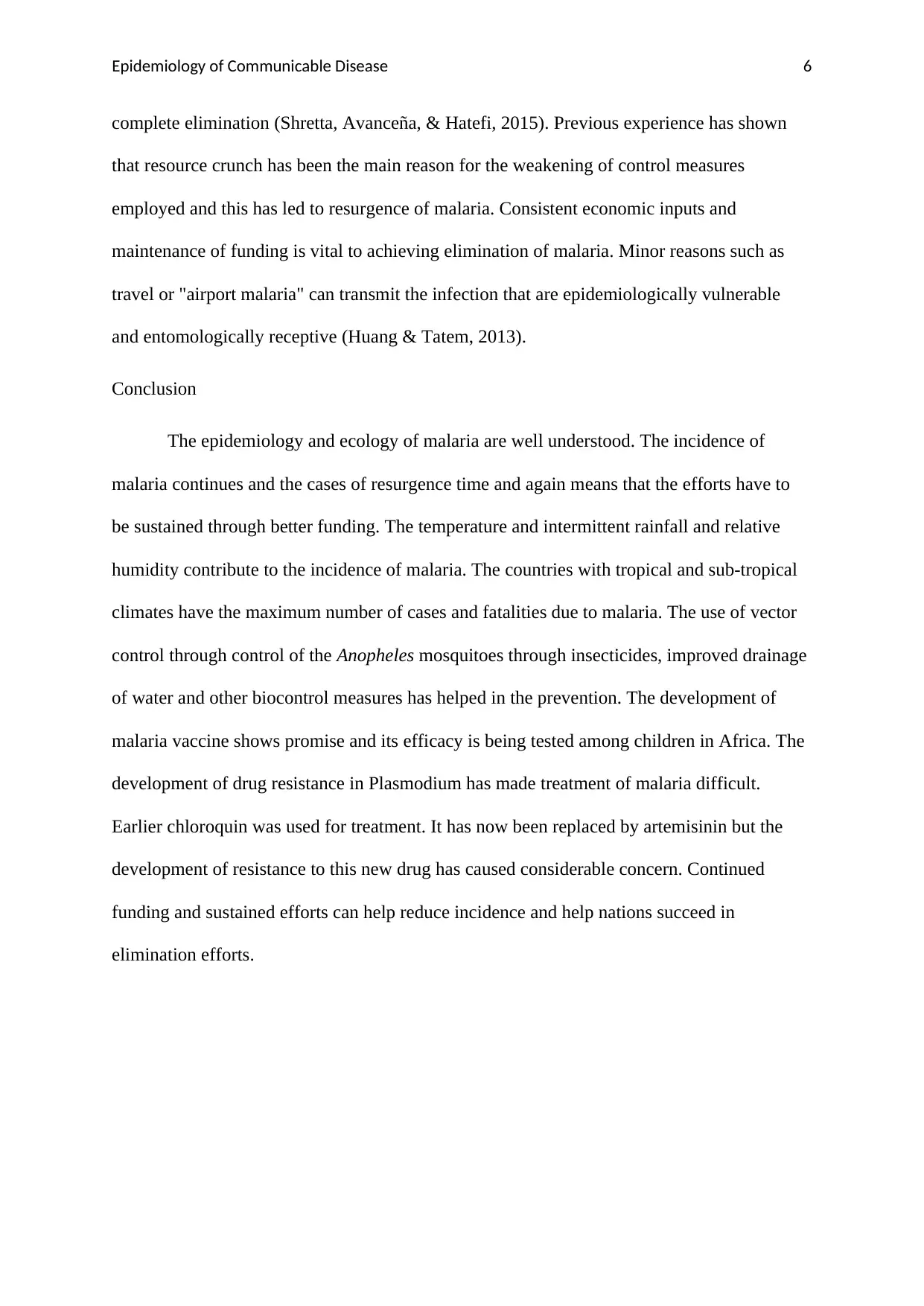
Epidemiology of Communicable Disease 6
complete elimination (Shretta, Avanceña, & Hatefi, 2015). Previous experience has shown
that resource crunch has been the main reason for the weakening of control measures
employed and this has led to resurgence of malaria. Consistent economic inputs and
maintenance of funding is vital to achieving elimination of malaria. Minor reasons such as
travel or "airport malaria" can transmit the infection that are epidemiologically vulnerable
and entomologically receptive (Huang & Tatem, 2013).
Conclusion
The epidemiology and ecology of malaria are well understood. The incidence of
malaria continues and the cases of resurgence time and again means that the efforts have to
be sustained through better funding. The temperature and intermittent rainfall and relative
humidity contribute to the incidence of malaria. The countries with tropical and sub-tropical
climates have the maximum number of cases and fatalities due to malaria. The use of vector
control through control of the Anopheles mosquitoes through insecticides, improved drainage
of water and other biocontrol measures has helped in the prevention. The development of
malaria vaccine shows promise and its efficacy is being tested among children in Africa. The
development of drug resistance in Plasmodium has made treatment of malaria difficult.
Earlier chloroquin was used for treatment. It has now been replaced by artemisinin but the
development of resistance to this new drug has caused considerable concern. Continued
funding and sustained efforts can help reduce incidence and help nations succeed in
elimination efforts.
complete elimination (Shretta, Avanceña, & Hatefi, 2015). Previous experience has shown
that resource crunch has been the main reason for the weakening of control measures
employed and this has led to resurgence of malaria. Consistent economic inputs and
maintenance of funding is vital to achieving elimination of malaria. Minor reasons such as
travel or "airport malaria" can transmit the infection that are epidemiologically vulnerable
and entomologically receptive (Huang & Tatem, 2013).
Conclusion
The epidemiology and ecology of malaria are well understood. The incidence of
malaria continues and the cases of resurgence time and again means that the efforts have to
be sustained through better funding. The temperature and intermittent rainfall and relative
humidity contribute to the incidence of malaria. The countries with tropical and sub-tropical
climates have the maximum number of cases and fatalities due to malaria. The use of vector
control through control of the Anopheles mosquitoes through insecticides, improved drainage
of water and other biocontrol measures has helped in the prevention. The development of
malaria vaccine shows promise and its efficacy is being tested among children in Africa. The
development of drug resistance in Plasmodium has made treatment of malaria difficult.
Earlier chloroquin was used for treatment. It has now been replaced by artemisinin but the
development of resistance to this new drug has caused considerable concern. Continued
funding and sustained efforts can help reduce incidence and help nations succeed in
elimination efforts.
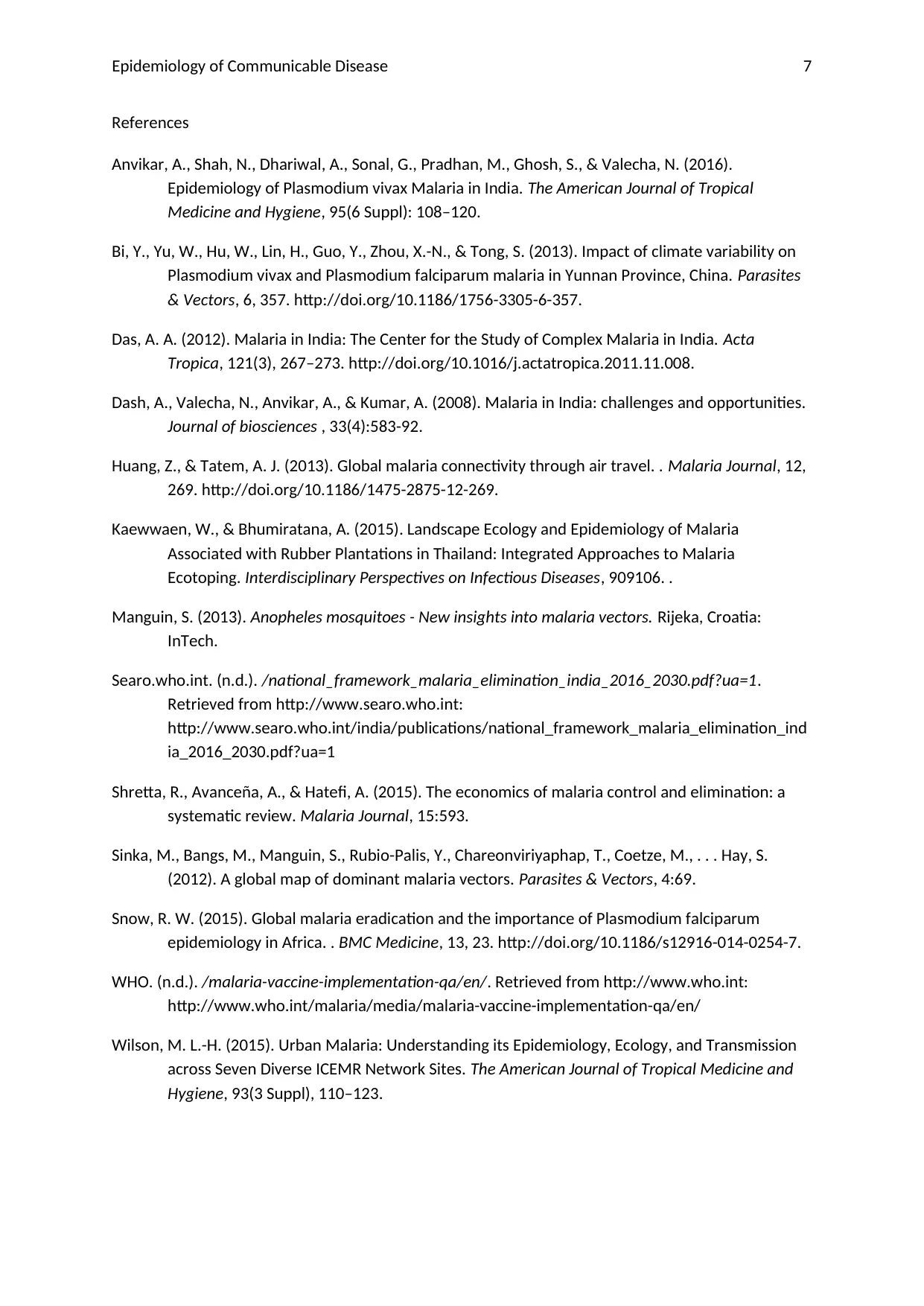
Epidemiology of Communicable Disease 7
References
Anvikar, A., Shah, N., Dhariwal, A., Sonal, G., Pradhan, M., Ghosh, S., & Valecha, N. (2016).
Epidemiology of Plasmodium vivax Malaria in India. The American Journal of Tropical
Medicine and Hygiene, 95(6 Suppl): 108–120.
Bi, Y., Yu, W., Hu, W., Lin, H., Guo, Y., Zhou, X.-N., & Tong, S. (2013). Impact of climate variability on
Plasmodium vivax and Plasmodium falciparum malaria in Yunnan Province, China. Parasites
& Vectors, 6, 357. http://doi.org/10.1186/1756-3305-6-357.
Das, A. A. (2012). Malaria in India: The Center for the Study of Complex Malaria in India. Acta
Tropica, 121(3), 267–273. http://doi.org/10.1016/j.actatropica.2011.11.008.
Dash, A., Valecha, N., Anvikar, A., & Kumar, A. (2008). Malaria in India: challenges and opportunities.
Journal of biosciences , 33(4):583-92.
Huang, Z., & Tatem, A. J. (2013). Global malaria connectivity through air travel. . Malaria Journal, 12,
269. http://doi.org/10.1186/1475-2875-12-269.
Kaewwaen, W., & Bhumiratana, A. (2015). Landscape Ecology and Epidemiology of Malaria
Associated with Rubber Plantations in Thailand: Integrated Approaches to Malaria
Ecotoping. Interdisciplinary Perspectives on Infectious Diseases, 909106. .
Manguin, S. (2013). Anopheles mosquitoes - New insights into malaria vectors. Rijeka, Croatia:
InTech.
Searo.who.int. (n.d.). /national_framework_malaria_elimination_india_2016_2030.pdf?ua=1.
Retrieved from http://www.searo.who.int:
http://www.searo.who.int/india/publications/national_framework_malaria_elimination_ind
ia_2016_2030.pdf?ua=1
Shretta, R., Avanceña, A., & Hatefi, A. (2015). The economics of malaria control and elimination: a
systematic review. Malaria Journal, 15:593.
Sinka, M., Bangs, M., Manguin, S., Rubio-Palis, Y., Chareonviriyaphap, T., Coetze, M., . . . Hay, S.
(2012). A global map of dominant malaria vectors. Parasites & Vectors, 4:69.
Snow, R. W. (2015). Global malaria eradication and the importance of Plasmodium falciparum
epidemiology in Africa. . BMC Medicine, 13, 23. http://doi.org/10.1186/s12916-014-0254-7.
WHO. (n.d.). /malaria-vaccine-implementation-qa/en/. Retrieved from http://www.who.int:
http://www.who.int/malaria/media/malaria-vaccine-implementation-qa/en/
Wilson, M. L.-H. (2015). Urban Malaria: Understanding its Epidemiology, Ecology, and Transmission
across Seven Diverse ICEMR Network Sites. The American Journal of Tropical Medicine and
Hygiene, 93(3 Suppl), 110–123.
References
Anvikar, A., Shah, N., Dhariwal, A., Sonal, G., Pradhan, M., Ghosh, S., & Valecha, N. (2016).
Epidemiology of Plasmodium vivax Malaria in India. The American Journal of Tropical
Medicine and Hygiene, 95(6 Suppl): 108–120.
Bi, Y., Yu, W., Hu, W., Lin, H., Guo, Y., Zhou, X.-N., & Tong, S. (2013). Impact of climate variability on
Plasmodium vivax and Plasmodium falciparum malaria in Yunnan Province, China. Parasites
& Vectors, 6, 357. http://doi.org/10.1186/1756-3305-6-357.
Das, A. A. (2012). Malaria in India: The Center for the Study of Complex Malaria in India. Acta
Tropica, 121(3), 267–273. http://doi.org/10.1016/j.actatropica.2011.11.008.
Dash, A., Valecha, N., Anvikar, A., & Kumar, A. (2008). Malaria in India: challenges and opportunities.
Journal of biosciences , 33(4):583-92.
Huang, Z., & Tatem, A. J. (2013). Global malaria connectivity through air travel. . Malaria Journal, 12,
269. http://doi.org/10.1186/1475-2875-12-269.
Kaewwaen, W., & Bhumiratana, A. (2015). Landscape Ecology and Epidemiology of Malaria
Associated with Rubber Plantations in Thailand: Integrated Approaches to Malaria
Ecotoping. Interdisciplinary Perspectives on Infectious Diseases, 909106. .
Manguin, S. (2013). Anopheles mosquitoes - New insights into malaria vectors. Rijeka, Croatia:
InTech.
Searo.who.int. (n.d.). /national_framework_malaria_elimination_india_2016_2030.pdf?ua=1.
Retrieved from http://www.searo.who.int:
http://www.searo.who.int/india/publications/national_framework_malaria_elimination_ind
ia_2016_2030.pdf?ua=1
Shretta, R., Avanceña, A., & Hatefi, A. (2015). The economics of malaria control and elimination: a
systematic review. Malaria Journal, 15:593.
Sinka, M., Bangs, M., Manguin, S., Rubio-Palis, Y., Chareonviriyaphap, T., Coetze, M., . . . Hay, S.
(2012). A global map of dominant malaria vectors. Parasites & Vectors, 4:69.
Snow, R. W. (2015). Global malaria eradication and the importance of Plasmodium falciparum
epidemiology in Africa. . BMC Medicine, 13, 23. http://doi.org/10.1186/s12916-014-0254-7.
WHO. (n.d.). /malaria-vaccine-implementation-qa/en/. Retrieved from http://www.who.int:
http://www.who.int/malaria/media/malaria-vaccine-implementation-qa/en/
Wilson, M. L.-H. (2015). Urban Malaria: Understanding its Epidemiology, Ecology, and Transmission
across Seven Diverse ICEMR Network Sites. The American Journal of Tropical Medicine and
Hygiene, 93(3 Suppl), 110–123.
Paraphrase This Document
Need a fresh take? Get an instant paraphrase of this document with our AI Paraphraser

Epidemiology of Communicable Disease 8
1 out of 8
Your All-in-One AI-Powered Toolkit for Academic Success.
+13062052269
info@desklib.com
Available 24*7 on WhatsApp / Email
![[object Object]](/_next/static/media/star-bottom.7253800d.svg)
Unlock your academic potential
© 2024 | Zucol Services PVT LTD | All rights reserved.





